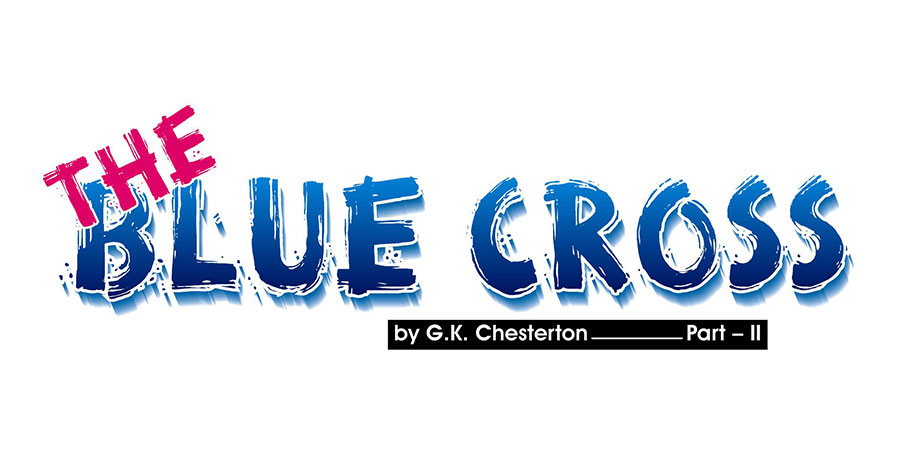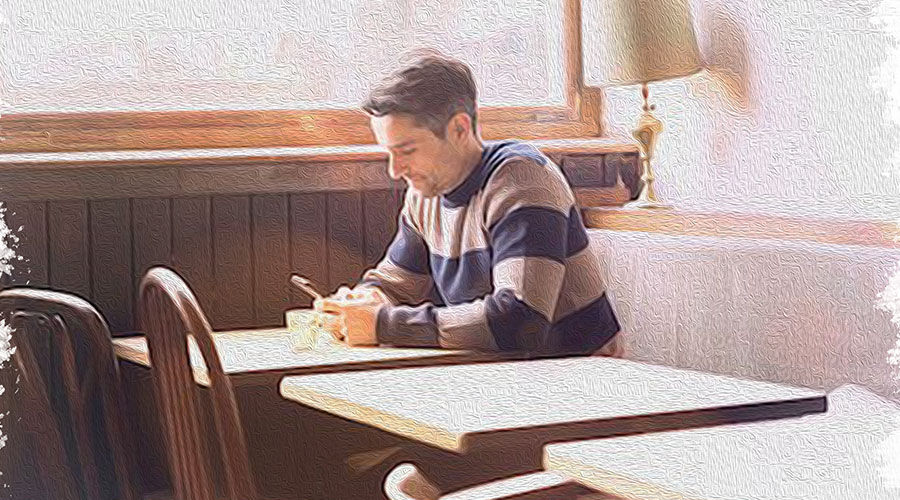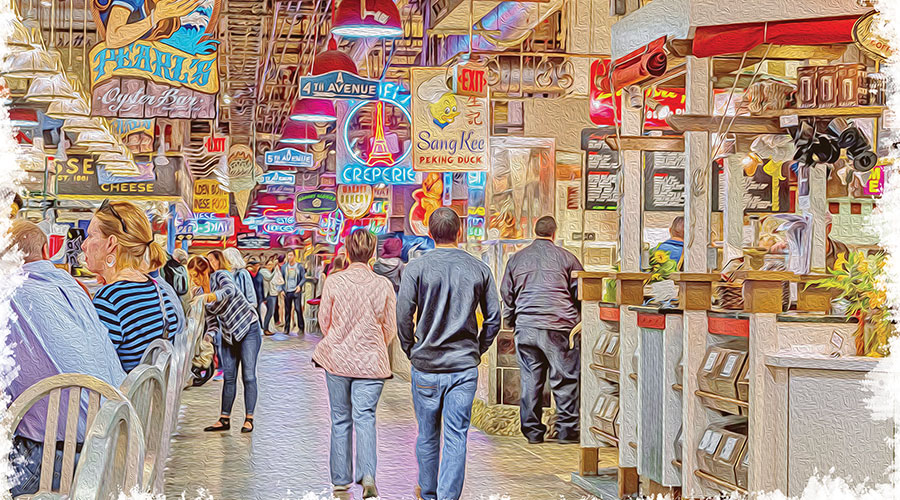An Epidemic
- 13 Apr - 19 Apr, 2024

Then he looked round at the restaurant with a refreshed air of interest, to see if there were any other traces of that singular artistic taste which puts the sugar in the salt–cellars and the salt in the sugar–basin. Except for an odd splash of some dark fluid on one of the white–papered walls, the whole place appeared neat, cheerful and ordinary. He rang the bell for the waiter. When that official hurried up, fuzzy–haired and somewhat blear–eyed at that early hour, the detective (who was not without an appreciation of the simpler forms of humour) asked him to taste the sugar and see if it was up to the high reputation of the hotel. The result was that the waiter yawned suddenly and woke up. "Do you play this delicate joke on your customers every morning?" inquired Valentin. "Does changing the salt and sugar never pall on you as a jest?" The waiter, when this irony grew clearer, stammeringly assured him that the establishment had certainly no such intention; it must be a most curious mistake. He picked up the sugar–basin and looked at it; he picked up the salt–cellar and looked at that, his face growing more and more bewildered.
At last, he abruptly excused himself, and hurrying away, returned in a few seconds with the proprietor. The proprietor also examined the sugar–basin and then the salt–cellar; the proprietor also looked bewildered. Suddenly the waiter seemed to grow inarticulate with a rush of words. "I zink," he stuttered eagerly, "I zink it is those two clergy–men." "What two clergymen?" "The two clergymen," said the waiter, "that threw soup at the wall." "Threw soup at the wall?" repeated Valentin, feeling sure this must be some singular Italian metaphor. "Yes, yes," said the attendant excitedly, and pointed at the dark splash on the white paper; "threw it over there on the wall." Valentin looked his query at the proprietor, who came to his rescue with fuller reports. "Yes, sir," he said, "it's quite true, though I don't suppose it has anything to do with the sugar and salt.
Two clergymen came in and drank soup here very early, as soon as the shutters were taken down. They were both very quiet, respectable people; one of them paid the bill and went out; the other, who seemed a slower coach altogether, was some minutes longer getting his things together. But he went at last. Only, the instant before he stepped into the street he deliberately picked up his cup, which he had only half emptied, and threw the soup slap on the wall. I was in the back room myself, and so was the waiter; so I could only rush out in time to find the wall splashed and the shop empty. It doesn’t do any particular damage, but it was confounded cheek; and I tried to catch the men in the street. They were too far off though; I only noticed they went round the next corner into Carstairs Street." The detective was on his feet, hat settled and stick in hand. He had already decided that in the universal darkness of his mind he could only follow the first odd finger that pointed; and this finger was odd enough. Paying his bill and clashing the glass doors behind him, he was soon swinging round into the other street. It was fortunate that even in such fevered moments his eye was cool and quick. Something in a shop–front went by him like a mere flash; yet he went back to look at it.

The shop was a popular greengrocer and fruiterer's, an array of goods set out in the open air and plainly ticketed with their names and prices. In the two most prominent compartments were two heaps, of oranges and of nuts respectively. On the heap of nuts lay a scrap of cardboard, on which was written in bold, blue chalk, "Best tangerine oranges and two a penny." On the oranges was the equally clear and exact description, "Finest Brazil nuts, and 4d. a lb." M. Valentin looked at these two placards and fancied he had met this highly subtle form of humour before, and that somewhat recently. He drew the attention of the red–faced fruiterer, who was looking rather sullenly up and down the street, to this inaccuracy in his advertisements. The fruiterer said nothing, but sharply put each card into its proper place.
The detective, leaning elegantly on his walking–cane, continued to scrutinise the shop. At last he said, "Pray excuse my apparent irrelevance, my good sir, but I should like to ask you a question in experimental psychology and the association of ideas." The red–faced shopman regarded him with an eye of menace; but he continued gaily, swinging his cane, "Why," he pursued, "why two tickets are wrongly placed in a greengrocer's shop like a shovel hat that has come to London for a holiday? Or, in case I do not make myself clear, what is the mystical association which connects the idea of nuts marked as oranges with the idea of two clergymen, one tall and the other short?" The eyes of the tradesman stood out of his head like a snail's; he really seemed for an instant likely to fling himself upon the stranger. At last he stammered angrily: "I don't know what you ‘ave to do with it, but if you is one of their friends, you can tell 'em from me that I'll knock their silly 'eads off, parsons or no parsons, if they upset my apples again." "Indeed?" asked the detective, with great sympathy. "Did they upset your apples?" "One of 'em did," said the heated shopman; "rolled 'em all over the street. I'd 'ave caught the fool but for havin' to pick 'em up." "Which way did these parsons go?" asked Valentin. "Up that second road on the left–hand side, and then across the square," said the other promptly. "Thanks," replied Valentin, and vanished like a fairy.
On the other side of the second square he found a policeman, and said: "This is urgent, constable; have you seen two clergymen in shovel hats?" The policeman began to chuckle heavily. "I 'ave, sir; and if you arst me, one of 'em was drunk. He stood in the middle of the road that bewildered that––" "Which way did they go?" snapped Valentin. "They took one of them yellow buses over there," answered the man; "them that go to Hampstead." Valentin produced his official card and said very rapidly: "Call up two of your men to come with me in pursuit," and crossed the road with such contagious energy that the ponderous policeman was moved to almost agile obedience. In a minute and a half the French detective was joined on the opposite pavement by an inspector and a man in plain clothes. "Well, sir," began the former, with smiling importance, "and what may?" Valentin pointed suddenly with his cane. "I'll tell you on the top of that omnibus," he said, and was darting and dodging across the tangle of the traffic. When all three sank panting on the top seats of the yellow vehicle, the inspector said: "We could go four times as quick in a taxi."
"Quite true," replied their leader placidly, "if we only had an idea of where we were going."
"Well, where are you going?" asked the other, staring. Valentin smoked frowningly for a few seconds; then, removing his cigarette, he said: "If you know what a man's doing, get in front of him; but if you want to guess what he's doing, keep behind him. Stray when he strays; stop when he stops; travel as slowly as he. Then you may see what he saw and may act as he acted. All we can do is to keep our eyes skinned for a queer thing."
"What sort of queer thing do you mean?" asked the inspector. "Any sort of queer thing," answered Valentin, and relapsed into obstinate silence. The yellow omnibus crawled up the northern roads for what seemed like hours on end; the great detective would not explain further, and perhaps his assistants felt a silent and growing doubt of his errand. Perhaps, also, they felt a silent and growing desire for lunch, for the hours crept long past the normal luncheon hour, and the long roads of the North London suburbs seemed to shoot out into length after length like an infernal telescope. It was one of those journeys on which a man perpetually feels that now at last he must have come to the end of the universe, and then finds he has only come to the beginning of Tufnell Park. London died away in draggled taverns and dreary scrubs, and then was unaccountably born again in blazing high streets and blatant hotels.

It was like passing through thirteen separate vulgar cities all just touching each other. But though the winter twilight was already threatening the road ahead of them, the Parisian detective still sat silent and watchful, eyeing the frontage of the streets that slid by on either side. By the time they had left Camden Town behind, the policemen were nearly asleep; at least, they gave something like a jump as Valentin leapt erect, struck a hand on each man's shoulder, and shouted to the driver to stop. They tumbled down the steps into the road without realising why they had been dislodged; when they looked round for enlightenment they found Valentin triumphantly pointing his finger towards a window on the left side of the road. It was a large window, forming part of the long facade of a gilt and palatial public–house; it was the part reserved for respectable dining, and labelled "Restaurant." This window, like all the rest along the frontage of the hotel, was of frosted and figured glass; but in the middle of it was a big, black smash, like a star in the ice. "Our cue at last," cried Valentin, waving his stick; "the place with the broken window."
"What window? What cue?" asked his principal assistant. "Why, what proof is there that this has anything to do with them?" Valentin almost broke his bamboo stick with rage. "Proof!" he cried. "Good God! the man is looking for proof! Why, of course, the chances are twenty to one that it has nothing to do with them. But what else can we do? Don't you see we must either follow one wild possibility or else go home to bed?" He banged his way into the restaurant, followed by his companions, and they were soon seated at a late luncheon at a little table, and looked at the star of smashed glass from the inside. Not that it was very informative to them even then. "Got your window broken, I see," said Valentin to the waiter as he paid the bill. "Yes, sir," answered the attendant, bending busily over the change, to which Valentin silently added an enormous tip. The waiter straightened himself with mild but unmistakable animation. "Ah, yes, sir," he said. "Very odd thing, that, sir." "Indeed?" Tell us about it," said the detective with careless curiosity.
"Well, two gents in black came in," said the waiter; "two of those foreign parsons that are running about. They had a cheap and quiet little lunch, and one of them paid for it and went out. The other was just going out to join him when I looked at my change again and found he'd paid me more than three times too much. 'Here,' I say to the chap who was nearly out of the door, 'you've paid too much.' 'Oh,' he says, very cool, 'have we?' 'Yes,' I say, and picks up the bill to show him. Well, that was a knockout." "What do you mean?" asked his interlocutor. "Well, I'd have sworn on seven Bibles that I'd put 4s, on that bill. But now I saw I'd put 14s, as plain as paint."
"Well?" cried Valentin, moving slowly, but with burning eyes, "and then?" "The parson at the door he says all serene, 'Sorry to confuse your accounts, but it'll pay for the window.' 'What window?' I say. 'The one I'm going to break,' he says, and smashed that blessed pane with his umbrella."
to be continued...
COMMENTS